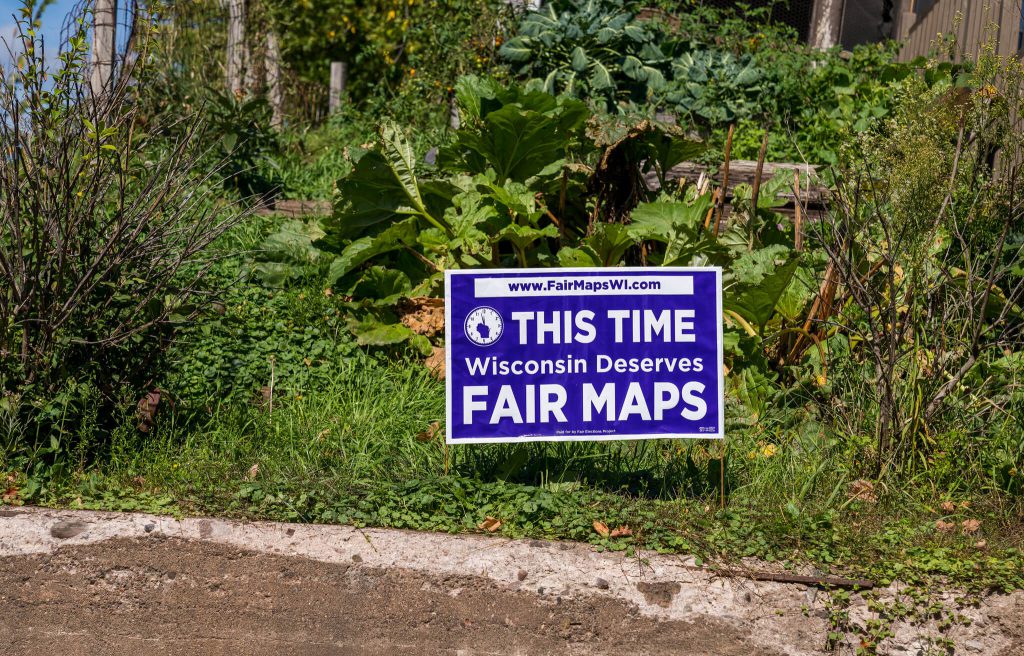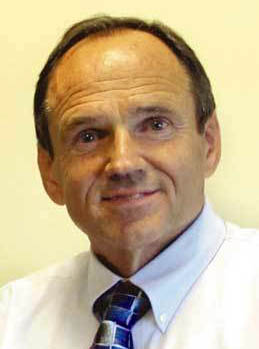Can Wisconsin Create Fair District Maps?
Former Republican State Sen. Dan Kapanke admits gerrymander, calls for fair maps.

A yard sign in Mellen, Wisconsin reads: “This Time Wisconsin Deserves Fair Maps,” paid for by the Fair Elections Project, FairMapsWI.com. The political sign supports redistricting legislation to reform gerrymandering. Wisconsin Fair Maps Coalition by Tony Webster (CC BY 2.0) https://creativecommons.org/licenses/by/2.0/
Former state Sen. Dan Kapanke, who is running as a Republican in western Wisconsin to retake the seat he lost to former Sen. Jennifer Shilling, laid out a surprising challenge to Democrats this week.
He admitted during the talk radio show La Crosse Talk PM on station WIZM that the current maps are gerrymandered and he challenged Democrats to draw up better ones.
It is more difficult to select which among the dozens of maps that have been proposed during the last round of redistricting and subsequent court battles; the challenge for Democrats might be choosing which one to give to Kapanke first.
The GOP maps were drawn up in secret at a private law firm and rammed through in 2011, with the help and votes of then-Sen. Kapanke, who was facing a recall election along with others, including Gov. Scott Walker, that year. (He was successfully recalled and Shilling replaced him under the previous maps. Shilling represented the district until she stepped down in May.)
“Kapanke now concedes what everyone already knew: that the Republicans rigged the maps in 2011,” responds Wisconsin Democracy Campaign Executive Director Matt Rothschild. “But if Dr. Obvious is all for fair maps, why doesn’t he pledge to support bills for nonpartisan redistricting, like five of his Republican colleagues did in the last session?”
A message to Kapanke’s campaign was not returned by publication time. A spokesperson responded to a message sent to his opponent, Brad Pfaff.
“Not only was Dan Kapanke part of the Republican caucus that drafted the current rigged maps, he signed a secrecy pledge and pushed to get the maps changed before his own recall election,” says Kate Constalie, a Democratic Party of Wisconsin spokeswoman. “No matter how hard he tries, Kapanke cannot erase his role in one of the worst gerrymandered maps in the country.”
A plethora of maps
There are many maps floating around that would divide Wisconsin into less gerrymandered districts, both for Congressional and legislative districts. Democrats, including former Rep. Fred Kessler (D-Milwaukee) have created maps, the nonpartisan Legislative Reference Bureau (LRB) has drawn maps, FiveThiryEight has its Atlas of Redistricting maps, even Isthmus’ artist David Michael Miller published his own “party-blind” maps.
On Wednesday, Gov. Tony Evers announced his appointments to The People’s Maps Commission, which he established earlier this year, charging it with listening to voters and experts and then drawing maps for the Legislature to consider for the 2021 redistricting process. The members were selected by a panel of nonpartisan retired judges.
“These folks are doctors, librarians, and teachers, not politicians, lobbyists, or elected officials. They come from each one of Wisconsin’s legislative districts, from Racine to Menomonie, and they represent the best Wisconsin has to offer,” Evers said Thursday in his weekly radio address.
“Folks, this isn’t a Democratic or Republican redistricting commission, and it’s certainly not the Tony Evers redistricting commission. It’s your commission.” The first public hearing is scheduled for Oct. 1 and more information is here.
Nonpartisan watchdogs
Most good-government groups that seek to avoid giving either party an unfair advantage recommend the Iowa redistricting model, put in place by Republicans in that state. In Iowa, nonpartisan civil servants draw the maps using criteria that sidestep partisanship or favoritism and the Legislature votes on them.
“If Kapanke is sincere and serious about disliking partisan gerrymandering he should immediately endorse the “Iowa Model” legislation that has been introduced in the last four sessions of the Wisconsin Legislature,” says Common Cause executive director Jay Heck. “It has bipartisan support and co-sponsorship so Kapanke would not be the only Republican supporting it.” (Four Republicans supported it.)
“All eight Wisconsin congressional districts have been gerrymandered to be safe for incumbents and only 10% of Wisconsin’s 99 Assembly districts and 33 State Senate districts are even remotely competitive as a result of the 2011 GOP gerrymander — considered to be the most partisan in the nation that year,” Heck adds. He notes that senate Dist. 32, where Kapanke is facing Evers’ former Ag secretary Pfaff, is one of the few “remotely competitive” legislative districts out of 132 districts.
“If he wins this year, he might want majority Republicans to gerrymander the 32nd to make it safer for him,” opines Heck. “Declaring support for the Iowa Model legislation would demonstrate that he is at least serious about favoring a fairer system. Failure to do so would be telling.”
Wisconsin Democracy Campaign’s website states that 55 out of 72 counties have endorsed nonpartisan maps by a county board vote or citizen referendum. Rothschild points out that 11 counties and the City of Racine have advisory referenda on the Nov. 3 ballot: “We need to let our elected officials know we’re fed up with map-rigging by whichever party is in power. We need fair maps for fair elections.”
Past attempts at fixes
Wisconsin maps have been described by a federal judge as the most gerrymandered in the nation and legal battles by opponents of the gerrymandered maps have moved all the way up to the U.S. Supreme Court, before the Court decided it would not intervene in partisan gerrymandering.
“Partisan gerrymandering is one of the greatest detriments to truly having a democracy that works,” said state Sen. Jeff Smith (D-Eau Claire) in a recent column. “States are obligated to redraw electoral districts after every census. Population shifts over a decade make it logical to adjust lines so districts are evenly represented.”
Smith authored legislation in 2009 as the chair of the Assembly Elections and Campaign Reform Committee to fix the process and wrote a bill to establish a constitutional amendment that would require non-partisan redistricting reform. He went on to say that in recent years, partisan gerrymandering has become even more targeted using technology and data on people’s political leanings — a process so partisan it makes the incumbent undefeatable.
“This practice,” said Smith, “diminishes your voice in government and completely defeats the purpose of a representative democracy if politicians can count on winning no matter how poorly they represent us.”
Reprinted with permission of Wisconsin Examiner.
More about the Gerrymandering of Legislative Districts
- Without Gerrymander, Democrats Flip 14 Legislative Seats - Jack Kelly, Hallie Claflin and Matthew DeFour - Nov 8th, 2024
- Op Ed: Democrats Optimistic About New Voting Maps - Ruth Conniff - Feb 27th, 2024
- The State of Politics: Parties Seek New Candidates in New Districts - Steven Walters - Feb 26th, 2024
- Rep. Myers Issues Statement Regarding Fair Legislative Maps - State Rep. LaKeshia Myers - Feb 19th, 2024
- Statement on Legislative Maps Being Signed into Law - Wisconsin Assembly Speaker Robin Vos - Feb 19th, 2024
- Pocan Reacts to Newly Signed Wisconsin Legislative Maps - U.S. Rep. Mark Pocan - Feb 19th, 2024
- Evers Signs Legislative Maps Into Law, Ending Court Fight - Rich Kremer - Feb 19th, 2024
- Senator Hesselbein Statement: After More than a Decade of Political Gerrymanders, Fair Maps are Signed into Law in Wisconsin - State Senate Democratic Leader Dianne Hesselbein - Feb 19th, 2024
- Wisconsin Democrats on Enactment of New Legislative Maps - Democratic Party of Wisconsin - Feb 19th, 2024
- Governor Evers Signs New Legislative Maps to Replace Unconstitutional GOP Maps - A Better Wisconsin Together - Feb 19th, 2024
Read more about Gerrymandering of Legislative Districts here





















